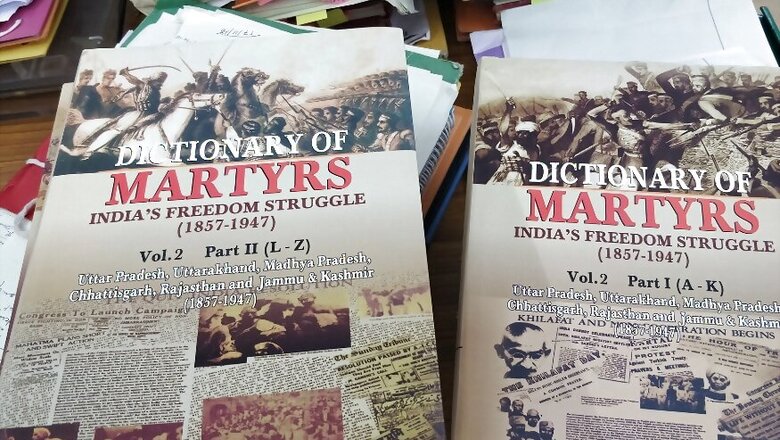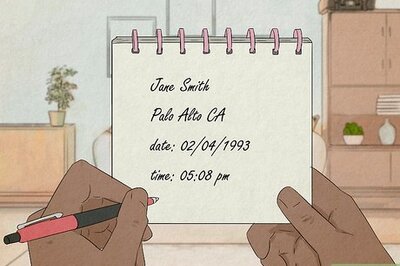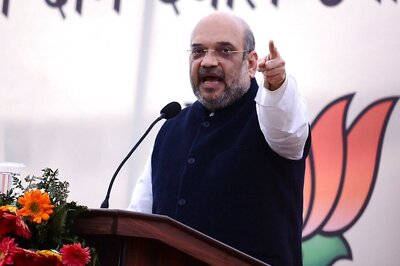
views
New Delhi: The Indian Council of Historical Research (ICHR) and Ministry of Culture have completed a five volume series – ‘Dictionary of Martyrs’ – that identifies 14,000 martyrs between 1857 and 1947 without their ideological leanings. It shows the martyrs’ biographical histories without associating them with Mahatma Gandhi or Sardar Vallabhbhai Patel.
The background of the project mentioned by the former chairman of the ICHR, Sabyasachi Bhattacharya, in the first volume of the dictionary said that, it is a project to compile a ‘National Register of Martyrs’. The project was initiated by the National Implementation Committee for organising the 150th anniversary celebrations of the 1857 uprising, and 60 years of India’s independence. The celebrations and funds for the same were granted by the Ministry of Culture.
Those involved with the project told News 18 that copies of the ‘Dictionary of Martyrs’ have been sent to Prime Minister Narendra Modi and he has been requested to officially launch the same. The Panchayati Raj Ministry has also been sent copies of the register so that they can identify the localities of the martyrs and install plaques in their memory.
Speaking to News 18, Executive Editor of the dictionary, and member secretary with additional charge of ICHR Rajaneesh Kumar Shukla said, “People are curious about martyrs but there is not enough material on them. We have identified 14,000 martyrs in our research project covering the period from 1857 to 1947."
Shukla added saying that, “These are biographical dictionaries that mention the contribution of martyrs, records their struggle without associating them with any ideology. Many primary and secondary sources were verified for this dictionary. You won’t find any political or ideological mention with the martyrs."
Shukla says that the project is special because, it is the first time ICHR commissioned a project which has been completed in a time-bound manner, “Since the time ICHR has come into existence it is the first commissioned project that has been completed", he said.
A committee comprising of historians and representatives of the Ministry of Culture and the National Archives of India was formed which decided that the project will produce a series of volumes containing brief biographical notes based on authentic archival and other documentary documents. The Advisory Committee also decided that the period to be covered by the project would be from 1857 to 1947. The volume contains biographies of 14,000 martyrs.
The committee also defined a martyr as per the Indian government’s definition to facilitate the distribution of awards and pensions. According to the centre, “A martyr is a person who died or who was killed in action and in detention or was awarded capital punishment while participating in a national movement for emancipation of India. It includes ex-INA or Ex-military person who died fighting the British."
In the present series of ICHR researchers have utilised archival and other contemporary documents which have been listed under each biographical note as references. Chairman ICHR Arvind P Jamkhedkar, is the General Editor, Executive Editor Rajaneesh Kumar Shukla, Research Consultant, Amit Kumar Gupta. The research and editorial team includes Ashfaque Ali, Mohammad Naushad, Mohammad Shakeeb Athar and Muhammad Niyas.
The dictionary has covered martyrs in every zone, and a large number of them have been found in regions like Uttar Pradesh, Uttarakhand, Madhya Pradesh, Chhattisgarh, Rajasthan, and Jammu and Kashmir.
There are quite a few biographical records of martyrs in the freedom struggle. For instance, on the occasion of Gandhi Centenary celebrations the Ministry of Education began a project to compile the ‘Who’s Who among Indian Martyrs’. At that time the definition of martyrs was ‘patriots who were hanged or killed in the freedom struggle’. Three volumes were published under the editorship of PN Chopra in 1969, 1972, 1973.
Like Chopra’s dictionary this one too identified Bhagat Singh, Sukhdev and Rajguru as martyrs. In the first week of November 2018 the Central Information Commission (CIC) requested the Home Ministry to explore whether Bhagat Singh can be accorded the status of martyr, and if it cannot be done, the CIC wants the government to explain the reason. Also responding to an RTI query, the Home Ministry said that they do not maintain any list of martyrs and have forwarded the query to the National Archives of India.
Shukla said, “The past works were the base for us. We took it forward from the past dictionaries. Our martyrs are also subject to rumors etc, but we have scientifically studied them and identified them. This not a book of ideologies. We have kept away from terms like ‘ugrawadi’, ‘atankwadi’, and only kept their martyrdom in mind while compiling this volume.
Professor Chaman Lal,0 who retired from Jawaharlal Nehru University (JNU) and was an advisor in setting up the ‘Bhagat Singh’ section in Delhi archives, said that the celebration of martyrs is not new, and since Independence not a day has gone by when martyrs have not been celebrated. “The publication division during Nehru’s time published a dictionary of martyrs by PN Chopra. The AAP government set up a Bhagat Singh section in Delhi archives to which I contributed. Martyrs like Bhagat Singh have left behind revolutionary legacies that can never be recognised by those systems that do not follow his ideas."
In his opinion, many successive governments use the name of martyrs for public appeasement because public emotion is attached to them. “This is a type of of public posturing. Bhagat Singh was not only fighting the British alone, but feudal lords as well. Various governments, now and those of the past try to confuse people by posturing about martyrs like him. If the governments want to respect Bhagat Singh, then the Chandigarh airport should be named after him as was proposed by the Punjab and Haryana governments," he said.
Read all the Latest News, Breaking News and Coronavirus News here




















Comments
0 comment